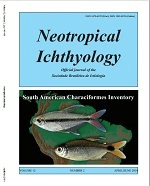
Neotropical Ichthyology
Scope & Guideline
Advancing ichthyological knowledge in the heart of the Neotropics.
Introduction
Aims and Scopes
- Taxonomy and Systematics:
The journal prioritizes the description of new species and the revision of existing taxa, providing clarity in the classification and understanding of Neotropical fishes. - Ecology and Biogeography:
Research articles often explore fish assemblage structures, habitat preferences, and ecological interactions, contributing to a deeper understanding of fish ecology and the factors influencing their distribution. - Conservation and Environmental Impact:
The journal includes studies on conservation strategies, the impact of pollution, habitat destruction, and climate change on fish populations, highlighting the need for sustainable management practices. - Integrative Approaches:
Utilizing molecular, morphological, and ecological data, studies often employ integrative approaches to address complex questions in ichthyology, enhancing taxonomic resolution and ecological understanding. - Functional Morphology and Physiology:
Research that investigates the morphological adaptations and physiological responses of fish to their environments, contributing to knowledge on how these factors influence survival and reproduction.
Trending and Emerging
- Impact of Anthropogenic Pollution:
Increased research on the effects of pollutants such as microplastics and heavy metals on fish health and ecosystems highlights a pressing concern for aquatic environments and biodiversity. - DNA Barcoding and Molecular Techniques:
The use of DNA barcoding and other molecular techniques to resolve taxonomic ambiguities and assess genetic diversity is on the rise, reflecting advancements in technology and methodologies in ichthyology. - Climate Change and Ecosystem Alterations:
Studies addressing the implications of climate change on fish populations, their habitats, and overall biodiversity are increasingly prevalent, signaling a response to global environmental changes. - Conservation Genetics:
Research focusing on the genetic diversity and population structure of threatened species is gaining momentum, emphasizing the need for informed conservation strategies in the face of habitat loss. - Community Ecology and Functional Diversity:
There’s a growing interest in understanding fish community dynamics and functional diversity, as researchers investigate how environmental changes affect fish assemblages and ecosystem functions.
Declining or Waning
- Traditional Fisheries Research:
Research focused solely on traditional fisheries practices and catch data has seen a decline, as more studies now emphasize ecological interactions and conservation rather than just fishery yields. - Morphological Studies Without Molecular Integration:
There has been a noticeable reduction in purely morphological studies that do not incorporate molecular techniques. The trend favors integrative approaches that combine both morphological and genetic data. - Single-Species Focus Studies:
Papers focusing exclusively on the biology or ecology of individual species are becoming less common. Instead, broader ecological or community-level studies are gaining traction. - Historical Taxonomic Reviews:
While taxonomic reviews are still essential, there appears to be a waning interest in historical taxonomic assessments without new data, as researchers seek to focus on current biodiversity and conservation issues.
Similar Journals

TAIWANIA
Exploring the intersection of ecology, evolution, and systematics.TAIWANIA is a prestigious and long-standing journal dedicated to the fields of ecology, evolution, and systematics, published by NATIONAL TAIWAN UNIVERSITY PRESS. Since its inception in 1947, this open-access journal has provided a vital platform for researchers to disseminate their findings, encouraging collaboration and innovation in the ecological sciences. With a 2023 impact factor placing it in Quartile 2 for Ecology and Quartile 3 for Ecology, Evolution, Behavior and Systematics, TAIWANIA is recognized for its quality and influence, ranking #267 out of 461 in Environmental Science and #426 out of 721 in Agricultural and Biological Sciences within Scopus. The journal currently publishes contributions from both local and international researchers, showcasing a diverse array of topics that address crucial ecological issues and facilitate the advancement of knowledge in the discipline. For those seeking rigorous research, engaging reviews, and a commitment to open access, TAIWANIA remains a significant resource for the global scientific community.
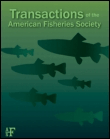
TRANSACTIONS OF THE AMERICAN FISHERIES SOCIETY
Illuminating the path for fisheries innovation and sustainability.TRANSACTIONS OF THE AMERICAN FISHERIES SOCIETY, published by Wiley, is a leading journal dedicated to the field of fisheries science and aquatic ecology, with a rich history dating back to its inception in 1872. As an esteemed publication within the realms of Aquatic Science and Ecology, Evolution, Behavior, and Systematics, it currently holds a Q2 quartile ranking, demonstrating its significance and influence in these disciplines. The journal is not open access, which enables a curated peer-review process while ensuring high-quality research dissemination. The journal serves as a vital platform for scholars and practitioners alike, providing essential insights into the management and conservation of aquatic resources. Its commitment to addressing contemporary challenges faced in fisheries and aquatic environments makes it indispensable for researchers, professionals, and students seeking to contribute to this dynamic field.
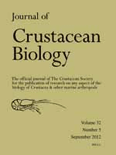
JOURNAL OF CRUSTACEAN BIOLOGY
Diving Deep into the World of CrustaceansJOURNAL OF CRUSTACEAN BIOLOGY, published by Oxford University Press, is a premier peer-reviewed journal dedicated to advancing the field of crustacean biology. With an ISSN of 0278-0372 and E-ISSN 1937-240X, this esteemed journal has been a critical platform for the dissemination of research since its inception in 1984, encompassing a diverse array of studies related to the biology, ecology, and conservation of crustaceans. As part of the Aquatic Science category, the journal ranks in the Q3 quartile, illustrating its increasing relevance and impact within the scientific community. Although it is not an open-access journal, the quality of content published here ensures that it is highly regarded among researchers, professionals, and students alike. With annual converged issues until 2024, the JOURNAL OF CRUSTACEAN BIOLOGY remains a vital resource for those interested in crustacean research and its implications for broader ecological studies.

FRAGMENTA ENTOMOLOGICA
Unraveling the complexities of insect science.FRAGMENTA ENTOMOLOGICA is a prominent peer-reviewed academic journal published by UNIV DEGLI STUDI DI ROMA LA SAPIENZA, focusing on various dimensions of entomology and insect science. With an ISSN of 0429-288X and an E-ISSN of 2284-4880, this journal has embraced an Open Access model since 2006, ensuring that valuable research is widely accessible to the global scientific community. Based in Italy, at the DIPARTIMENTO DI BIOLOGIA ANIMALE E DELL'UOMO in Rome, FRAGMENTA ENTOMOLOGICA is recognized for its commitment to high-quality research, ranking in the Q3 category across multiple categories, including Ecology and Insect Science, in 2023. Its Scopus rankings further underscore its relevance, showcasing its role in advancing knowledge in the fields of Ecology, Evolution, and Insect Behavior. This journal serves as an essential resource for researchers, professionals, and students interested in the intricate world of insects and their ecological roles, fostering academic discourse that bridges theoretical and practical entomological studies.
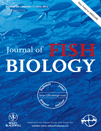
JOURNAL OF FISH BIOLOGY
Navigating the Waters of Fish ScienceJOURNAL OF FISH BIOLOGY, published by Wiley in the United Kingdom, is a distinguished peer-reviewed journal dedicated to advancing the understanding of the biology and relationships of fishes. With a robust history from its inception in 1969 to its future publications extending into 2024, the journal occupies a pivotal position in the academic landscape of aquatic sciences and ecology. Holding a notable Impact Factor and recognized within the second quartile (Q2) for both Aquatic Science and Ecology, Evolution, Behavior and Systematics, it serves as an essential resource for researchers, professionals, and students alike. The journal’s contributors delve into diverse topics ranging from evolutionary biology to conservation strategies, fostering a dynamic interchange of knowledge and innovation within the fish biology community. Access options are currently via subscription, ensuring high-quality, curated content that reflects the latest empirical research and theoretical advancements in the field.

ANNALES ZOOLOGICI FENNICI
Pioneering Discussions in Zoological ConservationANNALES ZOOLOGICI FENNICI, published by the Finnish Zoological Botanical Publishing Board, is a prominent scientific journal dedicated to advancing the fields of Animal Science, Zoology, Ecology, Evolution, Behavior, and Systematics. Based in Finland and serving an international audience, this journal has been an essential resource since its inception in 1974, offering valuable insights into biodiversity, conservation, and ecological dynamics. While it holds a respectable Q3 quartile ranking across several relevant categories in 2023, its impactful contributions to the scientific community continue to promote critical discussions and foster research collaborations. Although the journal is not currently open access, its robust indexing in Scopus and recognition within the academic community underscore its significance. As a researcher, professional, or student, engaging with the ANNALES ZOOLOGICI FENNICI not only enriches your knowledge but also aligns you with the forefront of zoological research and conservation studies.

ICHTHYOLOGICAL RESEARCH
Unveiling the secrets of fish ecology and habitats.Ichthyological Research is a prominent journal in the field of ichthyology, focusing on the biology, ecology, and conservation of fish species and their habitats. Published by Springer Japan KK, this journal has been a significant contributor to aquatic research since its inception in 1996 and will continue to disseminate cutting-edge findings through 2024. With an Impact Factor that places it within Q2 of the Ecology, Evolution, Behavior, and Systematics category, it ranks #318 out of 721 in Scopus, situating it in the 55th percentile of its field. This journal serves as a valuable resource for researchers, professionals, and students, offering open access to vital studies that drive forward our understanding of fish ecology and biodiversity. Located in Tokyo, Japan, Ichthyological Research aims to bridge gaps between theoretical research and practical application, emphasizing the conservation of aquatic ecosystems.

AMPHIBIAN & REPTILE CONSERVATION
Championing the Cause of Herpetofauna ConservationAMPHIBIAN & REPTILE CONSERVATION, published by the Amphibian Conservation Research Center & Lab, is a leading journal dedicated to the field of herpetology and environmental conservation. With an ISSN of 1083-446X and an E-ISSN of 1525-9153, this journal serves as a vital resource for researchers, conservationists, and students interested in the preservation of amphibian and reptile species. The journal has achieved remarkable rankings, categorized in the Q2 quartile for Animal Science and Zoology, Ecology, and Nature and Landscape Conservation as of 2023, reflecting its significant contribution to the scientific community. Over the converged years from 2016 to 2024, the journal has established itself as an integral platform for disseminating research findings, fostering collaboration, and enhancing the understanding of biodiversity and ecosystem dynamics. By embracing an open-access approach, AMPHIBIAN & REPTILE CONSERVATION ensures that critical research is readily available to a global audience, promoting informed conservation efforts and policy advocacy to safeguard these vital species amidst their declining populations.
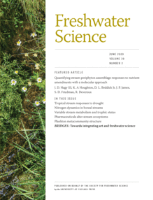
Freshwater Science
Shaping the Future of Freshwater ConservationFreshwater Science is a pivotal journal published by the University of Chicago Press, dedicated to advancing the understanding of freshwater ecosystems and their biodiversity. With an ISSN of 2161-9549 and an E-ISSN of 2161-9565, this journal has been a vital resource in the fields of Aquatic Science and Ecology, consistently ranked in the Q2 quartile across multiple categories in 2023. The journal encapsulates rigorous research and innovative studies aimed at addressing the ecological dynamics of freshwater environments from 2012 to 2024. Researchers and practitioners benefit from its open access options, which enhance the dissemination of knowledge while contributing to a better understanding of aquatic systems. With Scopus rankings that place it in the top 30% of its fields, Freshwater Science plays an influential role in fostering scientific dialogue and collaboration among professionals, making it an essential publication for anyone invested in freshwater conservation, management, and ecological impact.

Ichthyology and Herpetology
Bridging the Gap between Science and Aquatic EcosystemsIchthyology and Herpetology is a premier academic journal dedicated to the study of fish and amphibians, providing a dynamic platform for researchers and scholars within the fields of animal science and aquatic biology. Published by the American Society of Ichthyologists and Herpetologists, this journal has rapidly established its reputation, securing a Q1 ranking in prestigious categories such as Animal Science and Zoology, Aquatic Science, and Ecology, Evolution, Behavior and Systematics as of 2023. Offering both traditional and open access options, Ichthyology and Herpetology fosters the dissemination of cutting-edge research, reviews, and methodological advancements that are essential in understanding the biodiversity and conservation of aquatic and semi-aquatic species. Furthermore, with an impressive Scopus ranking placing it in the top-tier of its fields, this journal serves as a critical resource for professionals, academics, and students alike, supporting the ongoing advancement of knowledge in these vital ecological sectors.